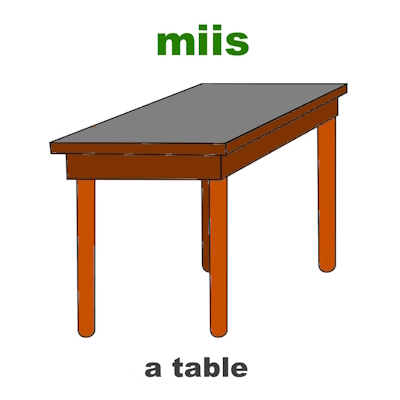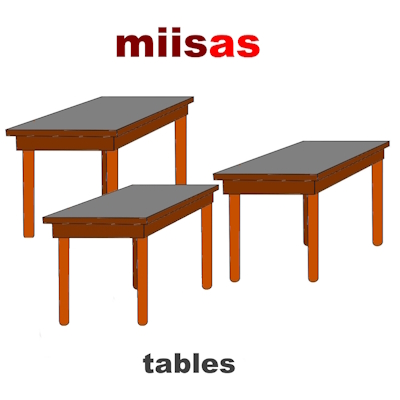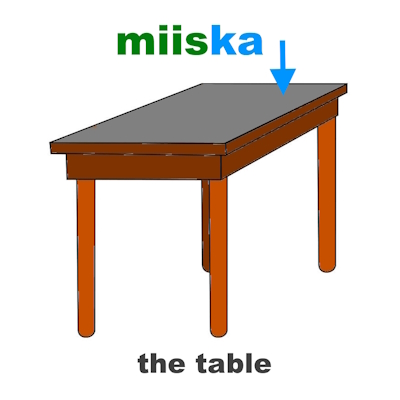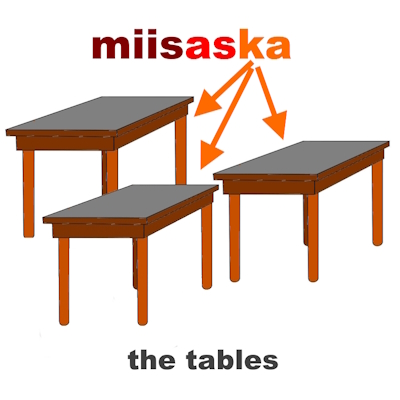 | Chapter 9 - Type 4 Nouns |
|---|
Reminder:
The indefinite singular noun is the basic form of the noun. No equivalent English article like "a" or "an" is placed before the noun.
Thus, buug will translate as "book" or "a book"; nin will translate as "man" or "a man," etc.
The form of the indefinite noun does not distinguish between masculine and feminine. It is the different suffixes added to the noun that will distinguish the grammatical gender.
In this chapter, we study in detail the formation of Type 4 nouns in the plural and in the definite form, singular and plural.
Indefinite Type 4 Nouns - Singular and Plural
 |
 |
 |
 |
| Type 4 Noun | Singular | Plural |
|---|---|---|
| Gender |
Nouns always masculine | Nouns always masculine |
| Noun form | One syllable ending with a consonant. | Add -a + duplication of the last consonant |
Tone |
The singular (absolute) follows the HL pattern if the syllable is long; H otherwise. |
|
Phonetic Changes:
-
A noun changes its final consonant n to m before -a:
nin = a man; niman = men.
| Plural of Type 4 Indefinite Nouns - Examples | |||
|---|---|---|---|
| Singular (fem.) | Translation | Plural (masc.) | Translation |
| miis | a table | miisas | tables |
| nin | a man | niman | men |
| qoys | a family | qoysas | families |
| af | a mouth | hafaf | mouths |
| koob | a cup | koobab | cups |
| buug | a book | buugag | books |
| san | a nose | sanan | noses |
| waan | a ram | waanan | rams |
| tuug | a thief | tuugag | thieves |
| dab | a fire, an arson | dabab | fires, arsons |
| wiil | a boy | wiilal | boys |
Type 4 Nouns - Formation of Definite Singular Noun
In Somali, the English article "the" is marked by suffixes added to the end of the indefinite noun.
This suffix starts with -k- for masculine nouns.
The vowel following -k- changes depending on whether the noun is absolute or the subject of a verb: -ka = absolute, -ku = subject.
| Absolute Noun | Subject Noun | |
|---|---|---|
| Masculine Suffix | -ka | -ku |
| Example with koob = cup | koob-ka -> koobka = the cup | koob-ku -> koobku = the cup |
Phonetic Changes:
-
The k of the masculine suffix disappears after the g sound:
Examples: buug = a book; buug + -ka -> buuga = the book.
| Singular of Definite Type 4 Nouns - Examples | |||
|---|---|---|---|
| Indefinite (masc.) | Absolute Definite | Subject Definite | Translation |
| miis | miiska | miisku | the table |
| nin | ninka | ninku | the man |
| qoys | qoyska | qoysku | the family |
| af | afka | afku | the mouth, the language |
| koob | koobka | koobku | the cup |
| buug | buuga | buugu | the book |
| san | sanka | sanku | the nose |
| waan | waanka | waanku | the ram |
| tuug | tuuga | tuugu | the thief |
| dab | dabka | dabku | the fire, the arson |
| wiil | wiilka | wiilku | the boy |
Type 4 Nouns - Plural Definite Noun Formation
Type 4 definite nouns form their plural by adding the masculine suffixes -ka and -ku to the indefinite plural noun.
| Plural of Type 4 Definite Nouns - Examples | |||
|---|---|---|---|
| Indefinite pl. (fem.) | Definite pl. absolute | Definite pl. subject | Translation |
| miisas | miisaska | miisasku | the tables |
| niman | nimanka | nimanku | the men |
| qoysas | qoysaska | qoysasku | the families |
| afaf | afafka | afafku | the mouths, the languages |
| koobab | koobabka | koobabku | the cups |
| buugag | buugaga | buugagu | the books |
| sanan | sananka | sananku | the noses |
| waanan | waananka | wanaanku | the rams |
| tuugag | tuugagka | tuugagku | the thieves |
| dabab | dababka | dababku | the fires, the conflagrations |
| wiilal | wiilasha | wiilashu | the boys |
Some additional Type 4 nouns:
- Dhul (dhulal, dhulka, dhulalka) = land, earth, soil
- Geel (geelel, geelka, geelelka) = herd of camels
- Jeeb (jeebaba, jeebka, jeebabka) = pocket
- Jiir (jiirar, jiirka, jiirarka) = mouse
- Mas (masas, maska, masaska) = snake
- Muus (muusas, muuska, muusaska) = banana
- Neef (neefaf, neefka, neefafka) = animal (cattle)
- Roob (roobab, roobka, roobabka) = rain
- War (warar, warka, wararka) = news
- Xoog (xoogag, xooga, xoogaga) = strength
| Previous Chapter | Next Chapter | Table of Contents |
|---|